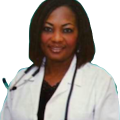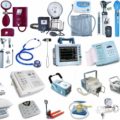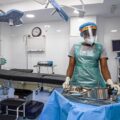According to the federal government statistics, as at two years ago, the stock of professionally regulated health workers in the Nigeria health sector has also recorded significant increase. The population equates to 36.3 percent of medical doctors per 100,000 population (doctor to population ratio of 1: 2753). Fifty nine percent of the registered medical practitioners were in good standing with 35 percent being females.
However, according to the Nigeria Medical Association (NMA), the high rate of insecurity, poor job satisfaction, low remuneration, unemployment, bad roads, and poor healthcare system has forced over 33,000 to leave the country, leaving behind only about 42,000 to man all health institutions in the country.
Reports have it that there are about 5,000 Nigerian medical doctors currently practising in the United States alone, and this does not include second or third generation Nigerian.
Most people are often confused about types of doctors in Nigeria. Here is a list of the types of doctors you can expect to find in Nigeria and what they do:
- Cardiologist: A cardiologist is a doctor that deals with the cardiovascular system. This means he or she treats any abnormality in our blood vessels and heart. This can include heart disease or condition which requires diagnosis and treatment.
- Audiologist: As the name suggests, an audiologist treats and evaluates anything and everything to do with audio or hearing abilities of a person. Since hearing is a very important sense, it requires an expert to treat the same.
- Dentist: According to American Dental Association, a dentist is a doctor of oral health. Oral health includes teeth, tongue and gums. A dentist is known to diagnose and treat issues of these three areas.
- ENT specialist: ENT stands for ear, nose and throat. A specialist who treats and diagnoses the issues and troubles of these three areas. Also known as an otolaryngologist, an ENT specialist is a physician to trained to treat the disorders of ENT.
- Gynaecologist: A gynaecologist is trained to treat the female reproductive system which includes the vagina, uterus, ovaries and breasts.
- Orthopaedic surgeon: An orthopaedic surgeon is known to deal with issues relating to the musculoskeletal system. This means muscles and bones. Any fracture, pain or abnormality of these areas need to be consulted about with an orthopaedic surgeon.
- Paediatrician: Paediatricians are doctors who treat children. Since a child’s body functions in a different manner from ours, due to many factors like age and growing stages, their illness and health issues are different from an adult. A paediatrician helps in mental behaviour issues and physical health problems.
- Psychiatrists: Mental health is a vast field which requires our uttermost attention. Therefore, to treat what goes inside a human brain is difficult, due to the uncertainty of it. A psychiatrist helps treat and diagnose issues of mental health.
- Neurosurgeon: Is a physician who specializes in the diagnosis and surgical treatment of disorders of the central and peripheral nervous system including congenital anomalies, trauma, tumors, vascular disorders, infections of the brain or spine, stroke, or degenerative diseases of the spine
- Radiologist: A radiologist for diagnosing diseases and internal & external injuries with the help of imaging techniques like x-rays, CT scan, MRI and ultrasound etc. They are the first step towards the diagnosis of any sort, which cannot be done without a machine.
- Pulmonologist: Pulmonary means lungs, hence a doctor who treats lungs. Since the list of abnormalities and issues relating to lungs is long in modern times, a pulmonologist helps diagnose and treat common issues like lung cancer.
- Endocrinologist: An endocrinologist is responsible for treating the endocrine system which includes the pituitary gland, pancreas, ovaries, thyroid, hypothalamus etc. they help in treating diabetes, hyperthyroidism etc.
- Oncologist: Oncology involves the study of all types of cancers. This involves the radiation, medical and surgical. Oncologists can specialise in one type of cancer as well as the field is vast.
- Neurologist: As the name suggests, a neurologist is responsible for treating and diagnosing issues of the nervous system. Our nervous system includes our brain, spinal cord, sensory organs, and all the nerves.
- Cardiothoracic surgeon: Thorax means the chest. A cardiothoracic surgeon treats conditions of the heart, lungs, oesophagus and other organs in the chest.
- Family Physicians: Family physicians diagnose and treat diseases and injuries within the general population. They are the first point of contact for patients in the health care system and may refer patients to specialists when needed.
- Public Health Physician: A public health physician is a highly trained physician who focuses their efforts on improving the health of an entire population instead of solely on one-on-one patient treatment. The primary focus is on the prevention of disease within a community, and there are numerous responsibilities that he/she may have within the position.
Here are some tips for making your visit to the doctor go as smoothly as possible:
- Plan your appointments in advance. Add your annual and repeat visits to your calendar. (I like to schedule all my annual checkups during my birthday month to treat myself to good health.)
- Write down any questions you may have ahead of time, and bring paper and a pen for taking notes. Medical professionals always seem to be in a hurry, but it’s important to ask them questions and make note of the answers. Be proactive about your health: Don’t be a passive patient.
- Don’t show up late. If you have new insurance (NHIS or others) or your address has changed, arrive 10 minutes early to handle paperwork.
- When seeing a new doctor, show up at least 15 minutes early. You’ll need to fill out a form when seeing a new doctor, so don’t forget your driver’s license, insurance information, and your medical history or any information on your medical history you have available.
- If you think you might be contagious, be considerate of others. Don’t shake hands with anyone if you think you have a cold or the flu. And any time you cough or sneeze, be careful to cover your mouth.
- If you have an emergency, call ahead. When you feel you need to see a doctor or dentist right away, don’t just show up without an appointment. Most offices have more than one medical professional, and by alerting them ahead of time the staff can plan for you to be seen by someone else if your regular doctor or dentist is unavailable.
- Don’t be afraid to ask questions. You should be able to ask your doctor or dentist anything about your medical condition and your treatment, and that goes for details about medications: how much to take and for how long, should they be taken with other medications (and if so, which ones), what are the side effects, and so on. This visit may be your one time to do this for the year!
- Be polite to the office staff. They control access to the doctor or dentist, so they can be your best friends!






